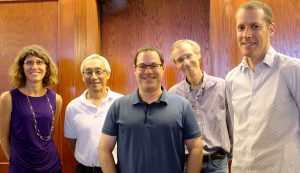It was perseverance that directed Kirsten Bryant, PhD, to a discovery that ultimately led to plans for multiple clinical trials for pancreatic cancer, one of the deadliest cancer types.

Bryant was recognized on Wednesday as one of three recipients of the Joseph S. Pagano Award, which recognizes outstanding work by the cancer center’s postdoctoral research associates. Bryant, who is now a research assistant professor in the UNC School of Medicine Department of Pharmacology, delivered a presentation on the work that led to the award.
Speaking at the ceremony, UNC Lineberger’s Brian Strahl, PhD, professor in the UNC School of Medicine Department of Biochemistry and Biophysics and chair of the award committee, said the process for selecting the recipient is challenging. “Every year is particularly difficult. There are so many outstanding papers and people who have done amazing work here.”
Ariel Pani, PhD, and John Pryor, PhD, were also honored, though they were not able to attend the ceremony.
Pani was selected for work she completed in the laboratory of UNC Lineberger’s Bob Goldstein, PhD, James L. Peacock III Distinguished Professor in the UNC-Chapel Hill Department of Biology. Pani is joining the faculty at the University of Virginia Department of Biology.
Pryor was honored for his research published as part of the lab of UNC Lineberger’s Dale Ramsden, PhD, a professor in the UNC School of Medicine Department of Biochemistry & Biophysics. Pryor is currently a research scientist at New England BioLabs in Ipswich, Massachusetts.
During the ceremony, Bryant’s mentor, UNC Lineberger’s Channing Der, PhD, Sarah Graham Kenan Distinguished Professor in the UNC School of Medicine Department of Pharmacology, shared some insights into the journey behind her latest publication.
In March, Bryant was first author of a Nature Medicine paper that detailed findings for a possible new therapeutic strategy for pancreatic cancer. Der said when Bryant started the project, she made an educated guess about what the end result might be.
“From the very first experiment, it showed she was wrong,” Der said, adding that went on to show a lot of perseverance that maybe this wasn’t what she expected originally, but “maybe there is something there.”
Der said this initial setback started Bryant on a multiple-year journey that ultimately revealed a mechanism for “starving” pancreatic cancer cells. Informed by this discovery, they became the first to use a drug to force pancreatic cancer to rely on a single energy source and then another drug to deny the cancer that same source.
Der and his collaborators have since initiated two clinical trials based on their laboratory findings, one at the University of Texas M.D. Anderson Cancer Center and the other at UNC Lineberger and the Dana-Farber Cancer Institute for KRAS-mutant pancreatic cancer patients.
“The amount of recognition for this study has been, I think, nothing short of rather amazing,” Der said.
Bryant shared details behind her findings for pancreatic cancer, a disease that is the third leading cause of cancer death in the United States.
“I came to the Der lab with an interest in pancreatic cancer research, and that’s because there’s a lot of work to do,” she said.
Bryant also outlined some of her future directions. She’s now studying the use of different compounds to improve this possible therapeutic combination, as well as working on identifying mechanisms of resistance.
“We’re certainly interested in improving this combination, and also seeing how widely applicable it is,” Bryant said, adding that they are also studying whether they could use this method in other cancers.
